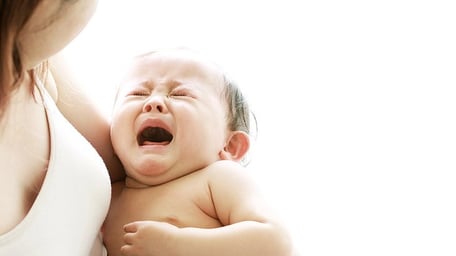
Unfortunately some women are just biologically and genetically predisposed to postnatal depression. Photo: Getty Images
We have known for a long time that up to one in 10 Australian women will experience depression during pregnancy and that increases to one in seven in the year following birth.
Research is now telling us that anxiety during pregnancy and the postnatal period is even more common than this.
So why are these still conditions that many women feel they have to suffer with in silence?
Especially when early warning signs of these conditions are recognisable and help is readily available.
Postnatal Depression Awareness Week is a vital step in educating women and society about this very real problem.
Here are some reasons why women still aren't getting early identification and treatment for PND.
- Women don't seek help. Many women still don't know what these conditions are and how to recognise them because they are either too busy or don't have access to good quality child birth education.
- Women can be very good at masking their depression and anxiety. Because of the social stigma around "not coping" as a new mum, women can feel too ashamed to ask for help and admit they are not finding the experience of motherhood as full filling as it is "supposed to" be. They can also be worried that their babies might be taken away from them if they admit they aren't coping.
- Women, their partners and even health professionals, don't recognise the early warning signs because they put it down to tiredness, low iron or just having to adapt to a new baby. So couples can go on for weeks hoping things will get better soon.
Causes of PND
There can be many factors that contribute to Postnatal Depression such as the birthing experiences; biological, social and psychological factors all play a role.
For many women it is a difficult or unexpected birthing experience that may trigger PND.
Nature really wants us to succeed at mothering. The hormones of labour and birth are meant to flood our bodies after birth, giving us feelings of well-being and love towards are new born babies.
We are supposed to feel like Wonder Woman - ready to take on anything. And women who do feel like this after birth can still feel like this after five months.
This is such a different picture to a woman who is scared, shocked or even just disappointed after her birth. She is far more likely to be feeling overwhelmed, shocked and tired in five months time.
Unfortunately many women don't understand how important it is not to interrupt the flow of their own hormones during birth.
Other women do know about this and want a calm, natural and fulfilling birth. However in today's highly medicalised birthing environments, Australian women are now more likely than not to have an intervention during their first birth.
This can leave many women feeling less than a good mother, as well as having to cope with the emotional and physical scars from their birthing experience.
Unfortunately some women are just biologically and genetically predisposed to PND. These are women who have a previous experience of PND, a family or personal history of mental health conditions such as depression, bipolar disorder or schizophrenia.
Others experience PND because of relationship difficulties with partner or parents/in law, traumatic or abusive childhood, particularly sexual abuse or certain personality types such as perfectionist or controlling.
Still more contributing factor are: a lack of family and community, social isolation, financial hardship, lack of close friends, particularly with children, relocation interstate or into a new area, age or stressful life events such as a death in the family or loss of job.
Once a woman has PND there can be a devastating effect on the whole family.
Partners can often feel confused, overwhelmed and helpless and are at risk of developing depression themselves...
Read the full story: here